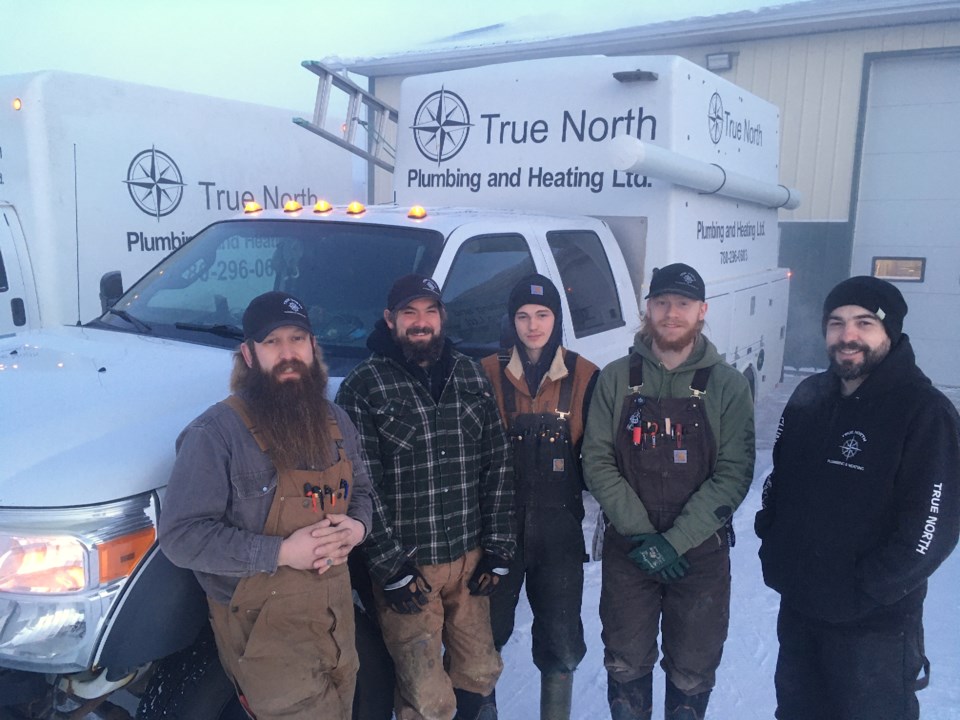SUNDRE – If he can get about five hours of sleep per night amid his hectic work schedule, Matt Sewart is a happy guy.
Even during the best of days when the weather is warm and pleasant, the journeyman plumber and gas fitter who owns True North Plumbing & Heating Ltd. and employs two other journeymen as well as two apprentices has a substantial backlog of jobs to catch up on.
“At one point I was booking two months out, if not a little bit further there before the holidays,” Sewart told the Albertan.
“And then we were getting cleaned up because the weather was so nice; it did a lot of good for helping us keep on track,” he said.
But the extreme cold snap that has settled into the region for at least the next few days has resulted in his phone ringing even more frequently.
“Every time you get a snap like this, you’ll usually see more boiler calls, furnace calls – things like that – just because everything’s working harder,” he said.
“Last night, I think I was out until 1 o’clock in the morning or something, and then my phone started going off again at about 6 this morning,” he said on Jan. 11 during a phone interview while taking a brief moment between jobs to chat.
“And that’s a good night; I got like, four or five hours of sleep! There was a week last winter when it was that -50 stretch; I maybe got eight to 10 hours of sleep that week because I was on-call.”
Fast forward to now, and he said the vast majority of the calls he’s been receiving – about 80 to 90 per cent – have been to deal with emergency repairs.
“Today, we did one water heater install; that was the only thing that we had scheduled. Other than that, it’s just emergency calls,” he said.
“If your furnace is down, we’ll be there pretty much today.”
Any other kinds of repairs are prioritized, with for example issues like no hot water or frozen water lines being bumped down “because you’re not going to freeze to death,” he said.
While the odd emergency call has been coming in since the weather began cooling off a little, the sudden drop into extreme cold seemed to cause the surge, he said.
Some of those calls, he added, are the result of putting off previously identified repairs or maintenance work.
“That stuff comes up, and then it really kind of rears its ugly head because everything’s running more,” he said.
“I have three journeymen, so we’re pretty capable of keeping up with most of the emergencies.”
But there are times when Sewart knows he won’t be able to provide same-day service for all of the calls for emergency service that he receives.
“If I can’t do it, I’ll tell people to call somebody else,” he said.
Among the primary culprits causing furnaces to either falter or outright fail when they’re needed most, is neglect.
“People not changing their filters,” he said when asked what are among the problems that can cause failures.
“Lots of non-maintenance; people not maintaining them.”
That being said, there’s only so much preventative maintenance a homeowner can do – at some point, regular wear and tear as the years slip by also inevitably plays a role.
“But if people do their maintenance properly and change or clean their filters like every 30 to 60 days, that helps out a lot,” he said, adding thermostat batteries should be changed annually.
Some furnaces are equipped with reusable filters, in which case he urges people with that kind of set up to vacuum the filter every month or two.
“If it’s a throwaway filter, change the filter every 30 to 60 days,” he said.
He also offered advice for people who prefer more expensive, single-use filters that capture more dust particles and therefore more quickly builds up a suffocating accumulation of debris.
“Lots of people go out and buy like the $30 filters for their furnaces thinking that’s the best idea ever; it’s not,” he said.
“Depending on your system, if you put too good of a filter in, it reduces the flow for your fan and then your furnace will overheat and shut down,” he said.
“You can run better filters. The thing is, you just have to be careful because if you run a really good filter, you got to change it more often,” he said.
Speaking from a personal perspective, he said, “I run the cheapest pleated filter available so that it grabs hair, dust, things like that. But then you get good flow rates through the furnace and the system can run properly.”
Aside from those few simple preventative steps, there’s not much else a person can do, he said.
“But those steps are huge, because then it just keeps the furnace running as best as it can.”



